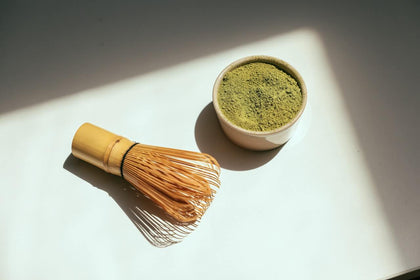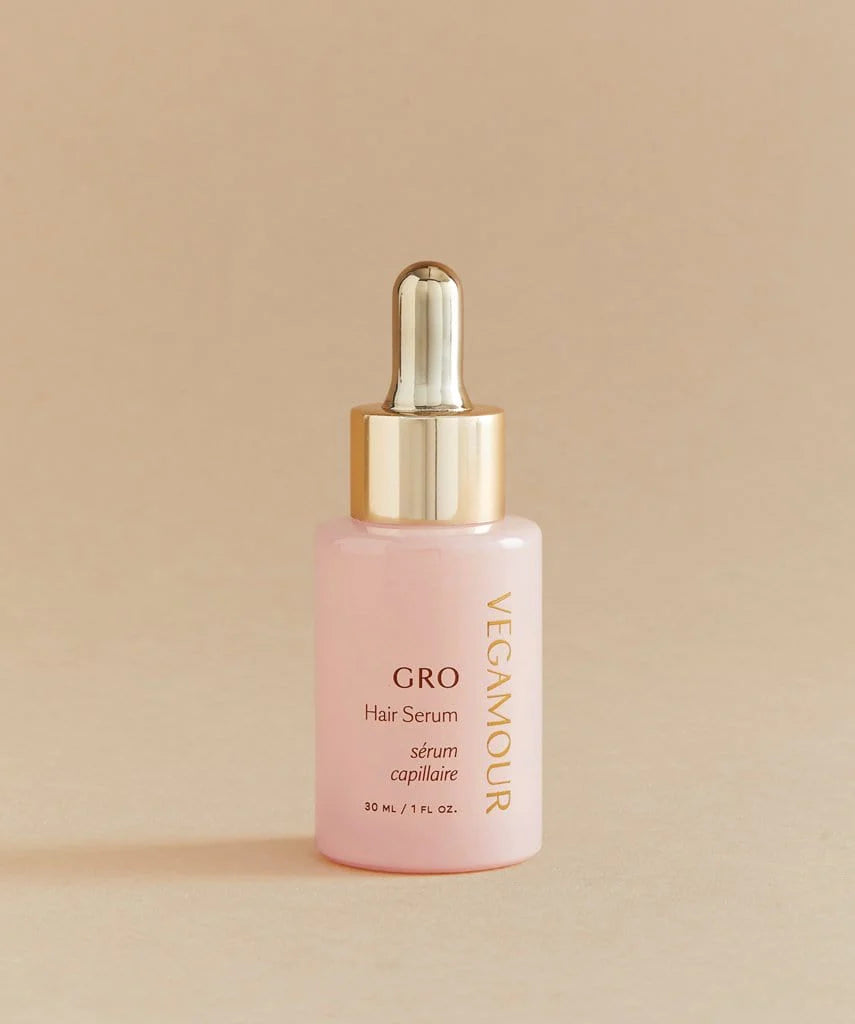As we age, the unwelcome debut of sparse-looking hair, bald spots and receding hairlines are not uncommon. The culprit? Hormonal conditions, including excess dihydrotestosterone production. In fact, elevated DHT levels can not only cause hair loss, but they might also make it more difficult for hair growth to occur. And while doctors might push prescription hair loss treatments to tackle this issue, there are other natural options.
When it comes to thinning hair and hair loss, VEGAMOUR believes in taking a holistic approach, such as a sustainable care routine, including hair wellness products designed to promote thicker, fuller looking hair. But you can also partake in certain vegan foods that might combat hair loss by working as DHT blockers.
Here's more about what DHT is, how it affects hair loss and top DHT-blocking foods you might want to add to your shopping list to get the thick, beautiful hair your want.
#include-related-slider#
DHT Production and Hair Loss
So before we get specific, let's back up a little. What exactly is natural DHT production? And how can this hormone cause hair loss?
Dihydrotestosterone, more simply known as DHT, is an androgen hormone known specifically for causing male pattern baldness. While most of the studies done on the impact DHT production can have on hair thinning and male pattern baldness have been done on male subjects, everyone has dihydrotestosterone in their bodies, including women. And DHT does have an impact on women's natural hair growth patterns.
The jury is still out on whether natural DHT blockers can help reduce female pattern baldness or even prevent hair loss for women, but studies on men who eat DHT-blocking foods for treating hair loss are promising.
Shop: VEGAMOUR Products for Thicker, Fuller Looking Hair
How Food Can Fight Hair Loss
If you're experiencing serious hair loss, you should talk to a medical professional to determine the cause. But if your hair loss has gradually occurred, eating food that blocks DHT production naturally might be able to help.
"Changing your diet can be a great way to support proper hair growth. If your hair is constantly breaking or doesn't appear as healthy as it should, it could be a sign of a nutrient deficiency," says nutritionist Heather Hanks.
While there's not yet much evidence that reducing the absorption of dihydrotestosterone actively works to encourage hair growth, eating food that inhibits DHT naturally might be able to prevent your hair loss problems from getting worse.
Shop: Kathleen Barnes' Top Vegamour Picks
A Must-Have for Thinning Hair
In addition to adding the following foods to your diet, also consider adding in a holistic hair wellness routine that includes VEGAMOUR products, like GRO Hair Serum. It can:
- Reduces signs of shedding by up to 85%*
- Increase the appearance of hair density by up to 56%*
*Based on a 120-day independent, third-party clinical study with 40 participants using GRO Hair Serum once daily.
Check out this before and after from Rheonna Rushing. "Being consistent has made the biggest difference on my hair journey," Rushing said. "Weekly deep steam conditions and using my VEGAMOUR drops once a day has contributed to the growth of my hair tremendously."
Foods That Might Block DHT
If it's your diet you're looking to tweak in support of hair wellness, we've done the research so you know where to start. Here are six foods that might block DHT and help combat thinning hair:
Green Tea
It's well-known that green tea, which is rich in antioxidants, is particularly good for your health. And studies show that drinking green tea might help promote hair growth by supplying the body with natural DHT blockers.
Green tea might also help prevent hair loss because it contains EGCG, aka epigallocatechin gallate, which is thought to act as a natural DHT inhibitor. While EGCG doesn't seem to block DHT production directly, it does reduce DHT levels that lead to hair thinning by protecting our dermal papilla cells (which are the cells found in our hair follicles) against cellular damage caused by the overproduction of DHT. Less damage equals less hair loss — and a healthier scalp environment to regrow hair. So sit back and enjoy that brewed green tea or fancy matcha late; your scalp will thank you.
Turmeric
If you're already a VEGAMOUR fan, you're probably aware that one of the active ingredients used in many best-selling hair wellness products is curcumin. This bioactive powerhouse is a natural polyphenol compound derived from turmeric, which is rich in antioxidants that fight against damaging free radicals that can cause hair loss.
Some promising studies suggest that turmeric, which is sourced from the same plant as our curcumin, might reduce the production of DHT by minimizing DHT levels. One study showed that substances that were structured and functioned similarly to natural curcumin helped work as DHT blockers by reducing the androgen receptive activity within particular cells. Eating turmeric, which is delicious in curry or your morning smoothie, may reduce DHT levels and the resulting hair loss by limiting your body's ability to absorb it.
Soy Protein
There's some good news for those of us committed to keeping animal-derived protein out of our diets: Soy protein products might help reduce DHT levels by inhibiting the absorption of 5 alpha-reductase, the enzyme that your body uses to convert testosterone into DHT. Studies have shown that consuming soy protein might help with hair growth without reducing natural testosterone levels, so you can work to prevent hair loss without worrying about disrupting your hormonal flow.
The studies on soy protein's potential to block DHT absorption via the production of 5 alpha-reductase have mostly been done on powdered soy protein used as a nutritional supplement. But anything that contains soy can work as a DHT blocker. This includes soybeans, tofu and soy milk — so make sure to get that DHT-blocking edamame appetizer next time you hit your favorite sushi spot.
Read: What to Know About Mung Beans for Hair Growth
Coconut Oil
The power of topically applied coconut oil is one of the best-kept secrets in the fight against thinning loss. While it's not suitable for all hair types, coconut oil can work to support hair growth by providing intense and targeted hydration. And bonus points: It turns out it might prevent hair fall by working as a DHT blocker! The studies that support coconut oil's ability to reduce DHT levels have mostly been done on lauric acid, which prevents your body from converting testosterone to DHT with good old 5 alpha-reductase, effectively fighting hair loss.
If you're interested in stopping hair fall, try swapping out your usual cooking oil for this powerful DHT blocker, an easy move that allows you to reduce DHT levels without adding any extra steps to your culinary routine.
Plus, add a topical hair serum like GRO Hair Serum to your routine to combat hair loss with daily application on wet or dry hair without the sticky mess of coconut oil.
Also: DIY Vegan Hair Masks to Try
Pumpkin Seeds
Unless you're serious about your seed game, it's likely the only time you'd consider eating pumpkin seeds is when you actually cut into a pumpkin. And while oven-roasted pumpkin seeds are delicious, you're missing out on a powerful DHT blocker if you're limiting your pumpkin seed consumption to one or two occasions per year.
One study showed that participants who supplemented their diet with pumpkin seeds — specifically cold-pressed pumpkin seed oil — experienced reduced hair loss compared to those who took a placebo. Additionally, pumpkin seeds are loaded with nutrients and minerals essential to preventing hair loss, including iron, zinc and magnesium. Try sprinkling pumpkin seeds over your favorite grain bowl or salad, and watch those DHT levels dip.
Also: Can Red Clover Help Hair Grow?
Foods Rich in Lycopene
If there's one general category of hair-healthy food you should introduce to reduce DHT levels, it's those that are rich in lycopene. Not only are they effective DHT blockers, but there are also so many yummy foods that contain this essential compound for reducing the production of DHT, including:
- Carrots
- Watermelon
- Pink grapefruit
- Tomatoes of all kinds
- Guavas
In fact, pretty much any orange or red food will contain levels of this compound that works to inhibit DHT production. One study showed that participants who ate tomatoes and other lycopene-rich foods had lower levels of the enzymes associated with 5-alpha reductase. So your lycopene-rich fruit salad will work as a DHT blocker by preventing 5-alpha reductase absorption, which, just as it does in soy protein, reduces hair loss by keeping your body from converting testosterone and keeping DHT levels low.
#include-related-slider#
Use Natural DHT Blockers To Promote Healthy Hair
While the process of aging and its effects on your hair are inevitable, you can fight back with natural DHT blockers. Work to improve hair health with a balanced diet of DHT-blocking foods and a targeted hair wellness routine that works for you, including the use of VEGAMOUR products with powerful phyto-actives that can help promote thicker, fuller-looking hair.
More From VEGAMOUR
- Shop: VEGAMOUR Picks for Men
- Why Exercise Should Be Part of Your Hair Growth Routine
- Can Smoking Cause Hair Loss?
- 3 Ways Nutrition Impacts Your Hair
Photo credit: Cup of Couple/Pexels
Back



















